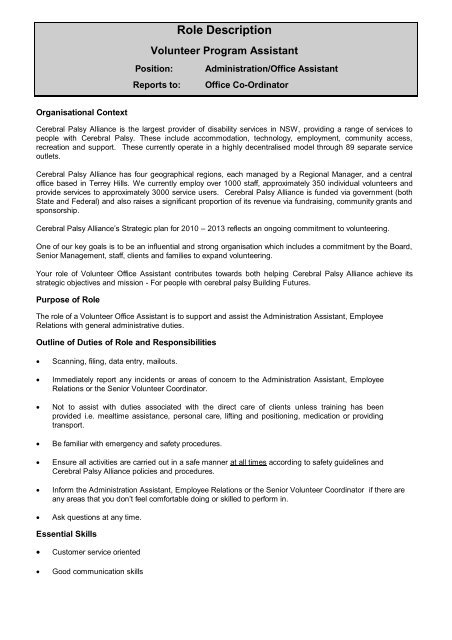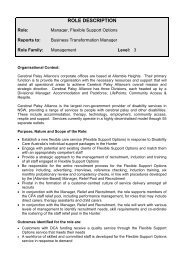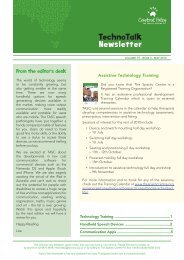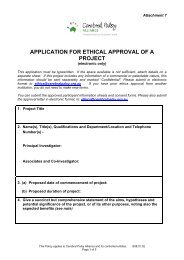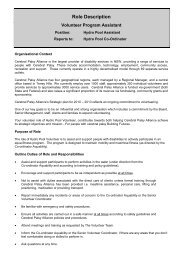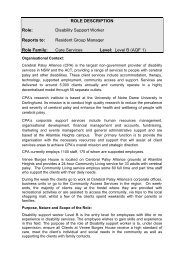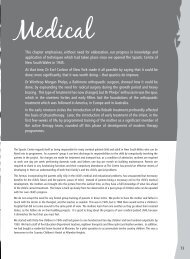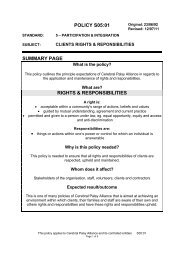Role Description - Administrative Assistant - Cerebral Palsy Alliance
Role Description - Administrative Assistant - Cerebral Palsy Alliance
Role Description - Administrative Assistant - Cerebral Palsy Alliance
Create successful ePaper yourself
Turn your PDF publications into a flip-book with our unique Google optimized e-Paper software.
<strong>Role</strong> <strong>Description</strong><br />
Volunteer Program <strong>Assistant</strong><br />
Position:<br />
Reports to:<br />
Administration/Office <strong>Assistant</strong><br />
Office Co-Ordinator<br />
Organisational Context<br />
<strong>Cerebral</strong> <strong>Palsy</strong> <strong>Alliance</strong> is the largest provider of disability services in NSW, providing a range of services to<br />
people with <strong>Cerebral</strong> <strong>Palsy</strong>. These include accommodation, technology, employment, community access,<br />
recreation and support. These currently operate in a highly decentralised model through 89 separate service<br />
outlets.<br />
<strong>Cerebral</strong> <strong>Palsy</strong> <strong>Alliance</strong> has four geographical regions, each managed by a Regional Manager, and a central<br />
office based in Terrey Hills. We currently employ over 1000 staff, approximately 350 individual volunteers and<br />
provide services to approximately 3000 service users. <strong>Cerebral</strong> <strong>Palsy</strong> <strong>Alliance</strong> is funded via government (both<br />
State and Federal) and also raises a significant proportion of its revenue via fundraising, community grants and<br />
sponsorship.<br />
<strong>Cerebral</strong> <strong>Palsy</strong> <strong>Alliance</strong>’s Strategic plan for 2010 – 2013 reflects an ongoing commitment to volunteering.<br />
One of our key goals is to be an influential and strong organisation which includes a commitment by the Board,<br />
Senior Management, staff, clients and families to expand volunteering.<br />
Your role of Volunteer Office <strong>Assistant</strong> contributes towards both helping <strong>Cerebral</strong> <strong>Palsy</strong> <strong>Alliance</strong> achieve its<br />
strategic objectives and mission - For people with cerebral palsy Building Futures.<br />
Purpose of <strong>Role</strong><br />
The role of a Volunteer Office <strong>Assistant</strong> is to support and assist the Administration <strong>Assistant</strong>, Employee<br />
Relations with general administrative duties.<br />
Outline of Duties of <strong>Role</strong> and Responsibilities<br />
<br />
<br />
<br />
<br />
<br />
<br />
<br />
Scanning, filing, data entry, mailouts.<br />
Immediately report any incidents or areas of concern to the Administration <strong>Assistant</strong>, Employee<br />
Relations or the Senior Volunteer Coordinator.<br />
Not to assist with duties associated with the direct care of clients unless training has been<br />
provided i.e. mealtime assistance, personal care, lifting and positioning, medication or providing<br />
transport.<br />
Be familiar with emergency and safety procedures.<br />
Ensure all activities are carried out in a safe manner at all times according to safety guidelines and<br />
<strong>Cerebral</strong> <strong>Palsy</strong> <strong>Alliance</strong> policies and procedures.<br />
Inform the Administration <strong>Assistant</strong>, Employee Relations or the Senior Volunteer Coordinator if there are<br />
any areas that you don’t feel comfortable doing or skilled to perform in.<br />
Ask questions at any time.<br />
Essential Skills<br />
<br />
<br />
Customer service oriented<br />
Good communication skills
Desirable Skills<br />
<br />
<br />
Experience working with people with disabilities<br />
Previous volunteering experience<br />
Essential Attributes<br />
<br />
<br />
<br />
Friendly and personable<br />
A team player, ability to work well with others<br />
Reliable and punctual<br />
Reimbursement<br />
<br />
<br />
<br />
Volunteers are entitled to reimbursement for out-of-pocket expenses incurred as a result of<br />
volunteering.<br />
Volunteers may be eligible for reimbursement of travel expenses.<br />
Prior approval from management must be sought for all expenditure.<br />
Benefits<br />
<br />
<br />
<br />
<br />
<br />
<br />
<br />
To become familiar with the variety of services offered by <strong>Cerebral</strong> <strong>Palsy</strong> <strong>Alliance</strong>.<br />
Acknowledgment of your valued volunteer contribution by clients, staff and families of <strong>Cerebral</strong> <strong>Palsy</strong><br />
<strong>Alliance</strong>.<br />
To assist with promoting positive images of people with disabilities in the community.<br />
To pursue your interest in assisting people with disabilities.<br />
To meet new people.<br />
To develop new skills.<br />
To be a member of a quality volunteer program.<br />
Desirable Training for This Position<br />
Additional training will be offered by <strong>Cerebral</strong> <strong>Palsy</strong> <strong>Alliance</strong> if deemed necessary by management for the<br />
specific role (for example Understanding <strong>Cerebral</strong> <strong>Palsy</strong>).
DEFINITION AND PRINCIPLES OF VOLUNTEERING<br />
Definition of Formal Volunteering<br />
Formal volunteering is an activity that takes place in not-for-profit organisations or<br />
projects and is undertaken:<br />
<br />
<br />
<br />
<br />
To be of benefit to the community and the volunteer<br />
Of the volunteer’s own free will and without coercion<br />
For no financial payment<br />
In designated volunteer positions only<br />
Principles of Volunteering<br />
<br />
<br />
<br />
<br />
<br />
<br />
<br />
<br />
<br />
<br />
Volunteering benefits the community and the volunteer.<br />
Volunteer roles are unpaid.<br />
Volunteering is always a matter of choice.<br />
Volunteering is not compulsorily undertaken to receive pensions or<br />
government allowances.<br />
Volunteering is a vehicle for individuals or groups to address<br />
human, environmental and social needs.<br />
Volunteering is an activity performed in the not-for-profit sector<br />
only.<br />
Volunteering is not a substitute for paid work.<br />
Volunteers do not replace paid workers nor constitute a threat to<br />
the job security of paid workers.<br />
Volunteering respects the rights, dignity and culture of others.<br />
Volunteering promotes human rights and equality.
VOLUNTEER RIGHTS<br />
Unlike paid staff, volunteers are not covered by award conditions or workplace<br />
agreements. Volunteers, however, do have rights, some of which are enshrined in<br />
legislation and some of which are the moral obligations of an organisation involving<br />
volunteers. The following list is the basis of rights as a volunteer.<br />
As a volunteer you have the right:<br />
<br />
<br />
<br />
<br />
<br />
<br />
<br />
<br />
<br />
<br />
<br />
<br />
<br />
To volunteer in a healthy and safe environment (refer Occupational<br />
Health & Safety Act/s<br />
To be interviewed and employed in accordance with equal opportunity<br />
and anti-discrimination legislation<br />
To be adequately covered by insurance<br />
To be given accurate and truthful information about the organisation for<br />
which you are volunteering<br />
To be reimbursed for out-of-pocket expenses incurred on behalf of the<br />
organisation for which you are volunteering<br />
To be given a copy of the organisation’s volunteer policy and any other<br />
policy that affects your role<br />
Not to fill a position previously held by a paid worker<br />
Not to do the work of paid staff during industrial disputes<br />
To have a role description and agreed volunteer hours<br />
To have access to a grievance procedure<br />
To be provided with orientation to the organisation<br />
To have your confidential and personal information dealt with in<br />
accordance with the principles of the Privacy Act 1988<br />
To be provided with sufficient training for you to do your role.
Model of Practice for Organisations<br />
Involving Volunteers<br />
In order to enhance the volunteer’s experience and comply with legislation and duty of<br />
care, <strong>Cerebral</strong> <strong>Palsy</strong> <strong>Alliance</strong> will:<br />
<br />
<br />
<br />
<br />
<br />
<br />
<br />
<br />
<br />
<br />
<br />
<br />
<br />
<br />
<br />
<br />
Interview and employ volunteers in accordance with anti-discrimination and equal<br />
opportunity legislation<br />
Provide volunteers with orientation and training<br />
Provide volunteers with a healthy and safe workplace<br />
Provide appropriate and adequate insurance coverage for volunteers<br />
Not place volunteers in roles that were previously held by paid staff or have been<br />
identified as paid jobs<br />
Differentiate between paid and unpaid roles<br />
Define volunteer roles and develop clear role descriptions<br />
Provide appropriate levels of support and management for volunteers<br />
Provide volunteers with a copy of policies pertaining to volunteer personnel<br />
Ensure volunteers are not required to take up additional duties during industrial<br />
dispute or paid staff shortage<br />
Provide all volunteers with information on grievance and disciplinary policies and<br />
procedures<br />
Acknowledge the rights of volunteers<br />
Ensure that the role of volunteer personnel complements but does not undermine<br />
the work of paid staff<br />
Offer volunteers for out-of-pocket expenses incurred on behalf of the organisation<br />
Treat volunteers as valuable team members, and advise them of the opportunities<br />
to participate in agency decisions<br />
Acknowledge the contributions of volunteers.


